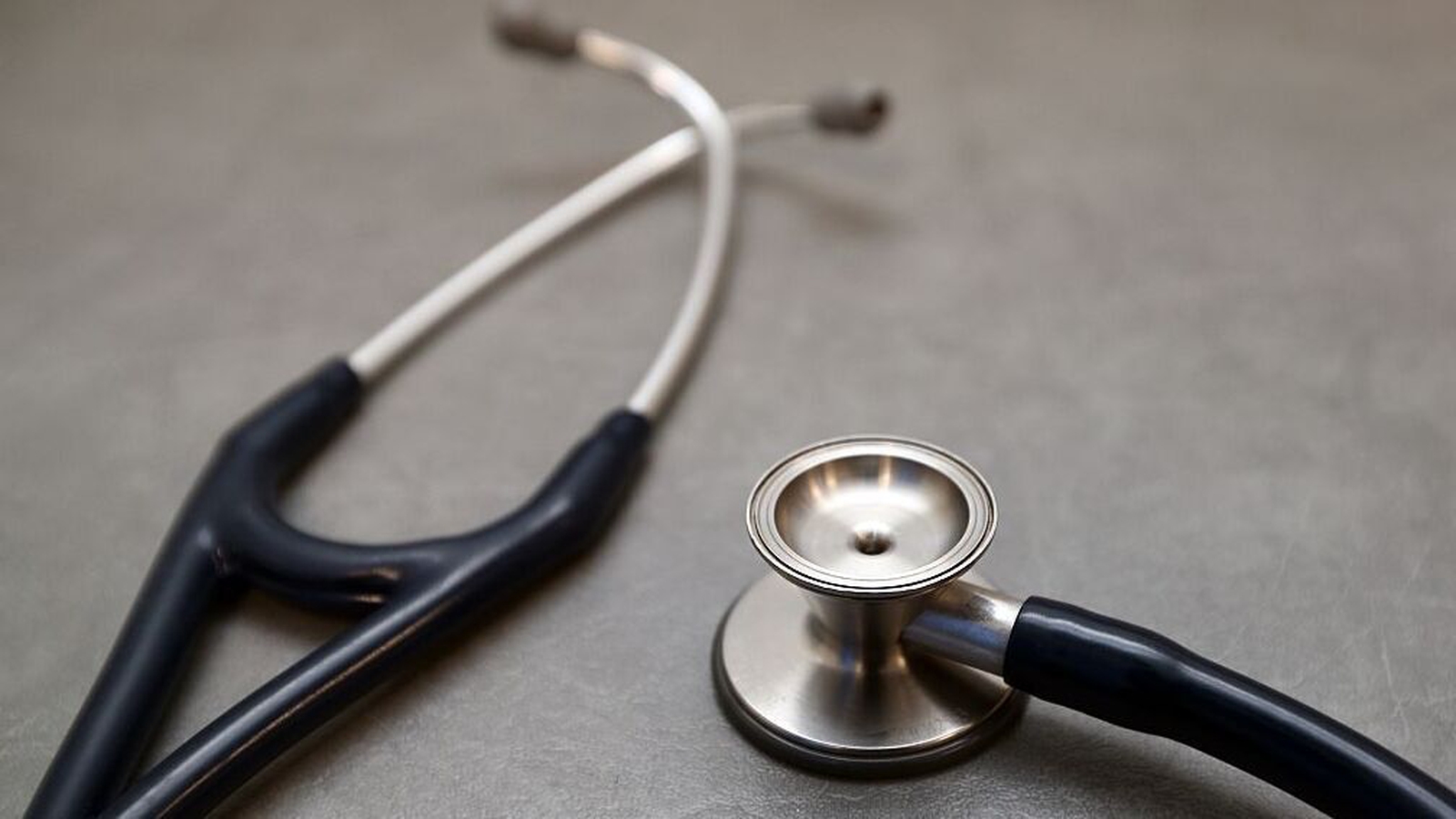Undercover in counselling services misleading women on abortion
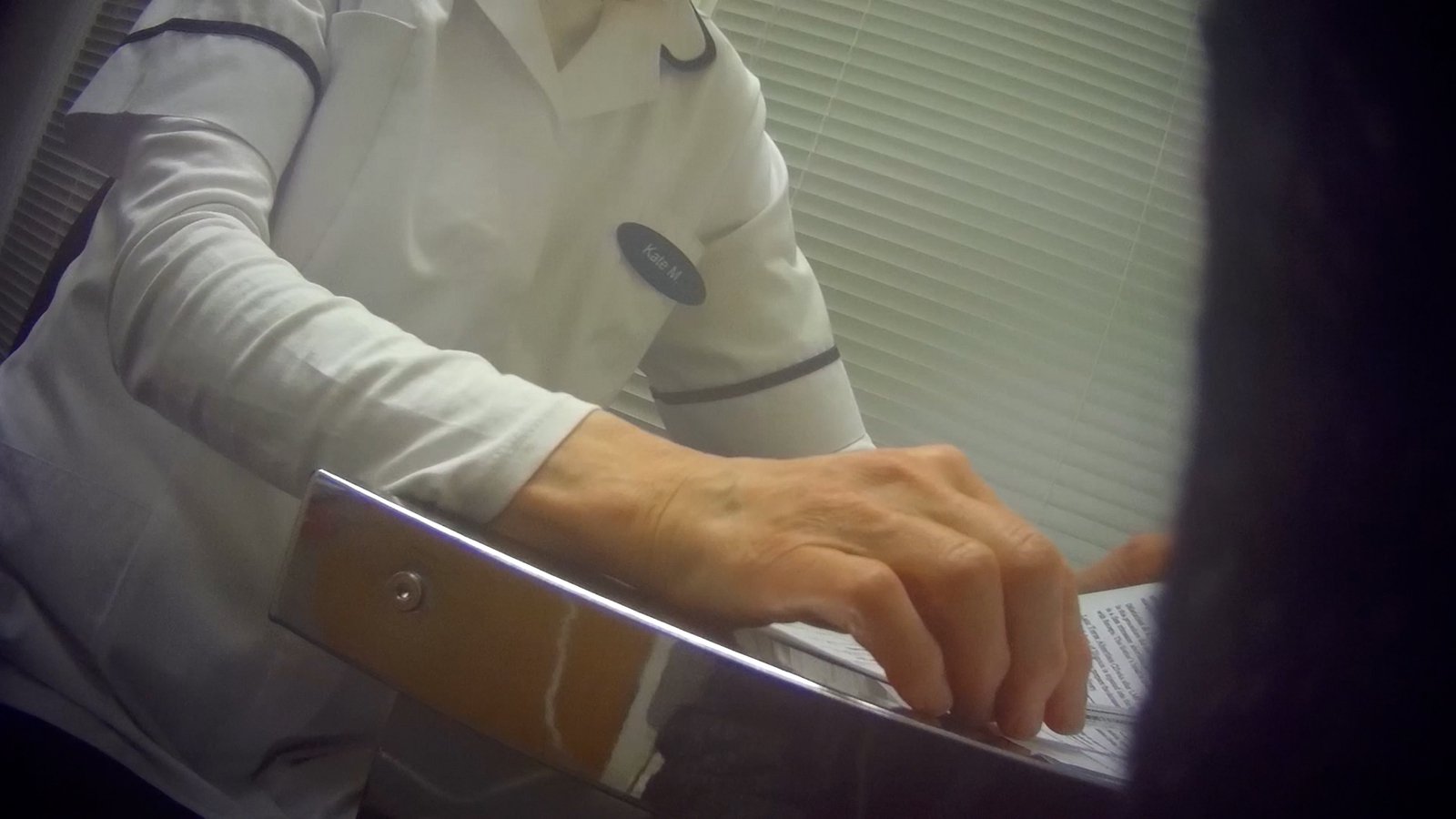
Imagine yourself as a young woman who has just discovered she’s pregnant. It is unplanned and unexpected. Looking for information on what your options might be, you turn to Google.
In those circumstances, many women will find the My Options service, the HSE’s freephone helpline which provides non-judgemental and confidential information and counselling for people experiencing an unplanned pregnancy, including information about how to access abortion services in Ireland.
But in an unregulated counselling sector, it’s all too easy to stumble on other, seemingly non-directional services.
While any individual or organisation is entitled to have its own beliefs, some agencies purport to provide unbiased and impartial advice when they in fact do the opposite.
For the last seven months, RTÉ Investigates has been examining Ireland’s abortion services.
This is not an investigation about the rights or wrongs of abortion but rather is focused on a Government commissioned review of how the Irish system is working, including going undercover to expose the counselling services misleading women about what they offer.
Our search took us to the heart of Derry City where on Strand Road a modern office block houses the Advocate Women’s Centre.
During research for our documentary, we heard its name mentioned on several occasions, including from a number of GPs dotted along the border who expressed concern about encountering women who had used the service.
As it turns out the Advocate Women’s Centre isn’t difficult to find. The centre currently runs eight Google search ads which have been viewed thousands of times. The ads appear impartial, even offering to provide information about the abortion pill. So too does the centre’s website which promises to give women experiencing an unplanned pregnancy advice on all options so they can make “an informed decision”.
Read more: Leading barrister calls for urgent reform of abortion services
A brief call or a few taps on an online contact form and very easily you could find yourself, just as we did, sitting in the centre’s reassuringly modern waiting room. Our undercover researcher posed as 27-year-old Alexandra, a childminder living in Letterkenny in Co Donegal who reached out to the Advocate Women’s Centre having unexpectedly discovered she was five weeks pregnant.
Our researcher was first introduced to a middle-aged woman described as an ‘advocate’. The woman encouraged Alexandra to slow down and consider her options, advice that in crisis pregnancy situation may be entirely sensible. But before long an approach in stark contrast to the centre’s very neutral outward look began to emerge.
“I do this thing, I call it my spiritual sweetshop,” the advocate told our researcher. “So, I have some scriptures and I believe that when we pray scriptures for God that he does make a change for us.”
“This little life, this gift of motherhood that he [God] gave you is a previous gift, and he doesn’t give it to everybody and for me as a mother, every one of my kids brought me something. From one mama to another, whatever path you take is going to be blessing even later in life because kids always bring blessings because they are a blessing, and God’s gift.”
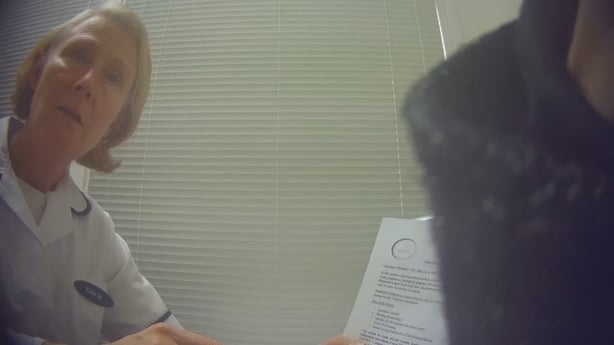
Our researcher was also introduced to the centre’s in-house nurse.
During the medical consultation Kate Meenagh, who’s a registered nurse with the Nursing and Midwifery Council of Northern Ireland, advised Alexandra that because, in her words, 80% of miscarriages happen in the first 12 weeks of pregnancy, having a scan could assist her decision making.
“If there’s no heartbeat that’s it then, the decision has been taken out of your hands and that’s easier for you,” Kate Meenagh said.
Consultant gynaecologist Dr Jonathan Lord reviewed the undercover recordings for RTÉ Investigates.
“There’s no rationale behind that at all,” he said. “The opponents of abortion are convinced that if someone has a scan that will promote bonding and therefore it will change their mind.”
But Kate Meenagh’s medical advice didn’t end there. She proceeded to tell our researcher that if she had a surgical abortion, she was at risk of pre-term births in future pregnancies.
“Because they have to force the cervix open to get the instruments in and the cervix is tight to hold the baby in,” Ms Meenagh suggested. “You know you’ve got a hair bobbin, and you use it too much and it loses its elasticity, that can happen with the womb.”
Such advice is, in Dr Lord’s opinion, “absolutely extraordinary”: “It sounds like it’s advice designed to frighten and has no place in modern healthcare practice.”
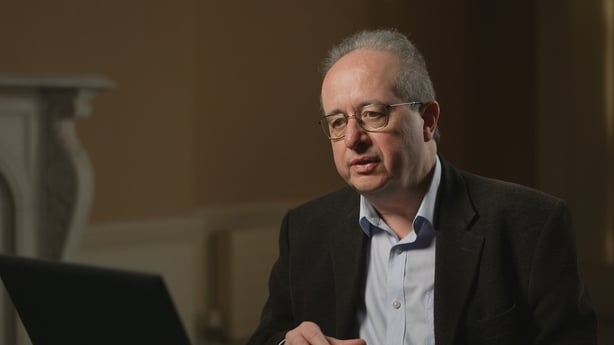
Yet the Advocate Women’s Centre has plans to expand. Owned by Human Life International Ireland, the Irish branch of an American pro-life organisation which is headquartered in Knock in Co Mayo, RTÉ Investigates has learned it is to open a new centre in Drogheda, Co Louth, by next month.
In fact, on the day our researcher attended its Derry centre, volunteers were training a different nurse from “another centre in the south”.
The training was being provided, among others, by registered nurse Kate Meenagh who also told our undercover researcher that she was at increased risk of mental health issues should she decide to have an abortion.
“It’s regret, it’s depression, sometimes they have replacement babies, you know there’s just an emptiness and they want to replace what they lost,” Ms Meenagh offered.
In correspondence with RTÉ Investigates, Patrick McCrystal, Executive Director of Human Life International Ireland said he believes its information services fulfil a need which is not reflected in the current facilities available to pregnant women and it will continue to provide information to women who are in a difficult situation as a result of their pregnancy.
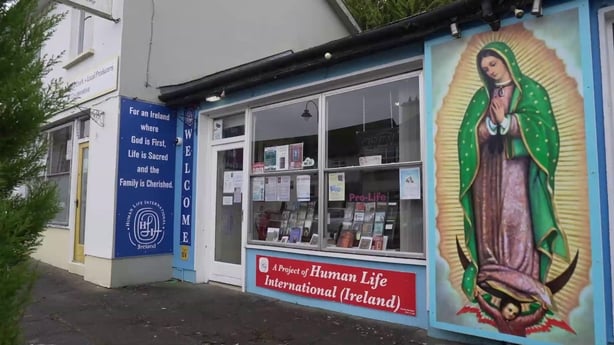
The need to mitigate against the risk of women encountering misinformation which may delay or preclude access to termination of pregnancy services, is just one of several recommendations made in a landmark review of Ireland’s abortion laws by Barrister Marie O’Shea. The Termination of Pregnancy Act provided for such a review three years after its implementation.
Delivered to Government early last year, the review recommends that the Department of Health should introduce quality assurance measures across the pregnancy counselling sector to safeguard women from “rogue counselling services”.
“They’re interfering with their reproductive health decisions, their autonomy and they’re able to do it with absolute impunity,” Ms O’Shea told RTÉ in her only media interview since completing her review. “It’s not regulated at all – it’s appalling.”
Another crisis pregnancy agency is Gianna Care which has offices in Galway, Kerry, and Dublin.
Operating in Ireland for some 13 years, the Gianna Care website does state it doesn’t provide or refer for abortions but also says it is committed to ensuring pregnant women receive “factual and evidence based information” to help them make “an informed choice”.
It too runs several Google search ads which have been viewed tens of thousands of times and which also purport to offer non-directional advice.
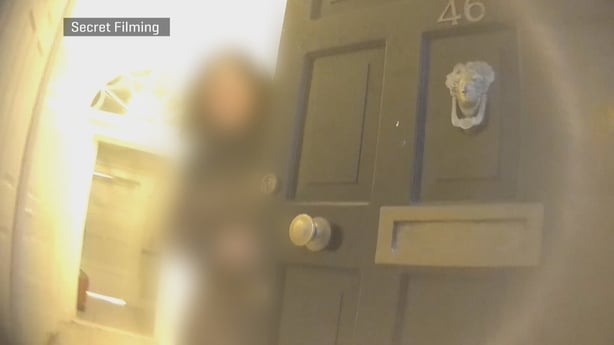
However, when RTÉ Investigates had an undercover researcher make an appointment at Gianna Care’s Dublin city office on Parnell Square, this time posing as an au pair in her twenties who had just discovered she was nine weeks pregnant, we again found evidence of a very different approach.
“You need to look at your emotional side… because that can be affected. Now if you’re the type that isn’t sensitive or doesn’t do a lot of thinking, you might be fine,” a Gianna Care representative stated as she repeatedly stressed what Gianna Care believes are the mental health impacts of having an abortion.
Among the symptoms Gianna Care claims women can suffer from post abortion are depression, eating disorders, sexual problems or promiscuity, drug and alcohol abuse and suicidal urges.
“Not everybody will have all those symptoms,” offered a second representative before adding: “You work with children, so you just think to yourself, will I be able to keep working with kids after this? Because some people can’t.”
RTÉ Investigates also had the footage reviewed by psychiatrist, Professor Veronica O’Keane.
“Outrage is the only word I can use to describe it,” Prof O’Keane said when shown the interaction. “It’s very extreme, very crude, and very regrettable. This really is a very good demonstration of the urgency with which we need legislation to regulate counselling services.”
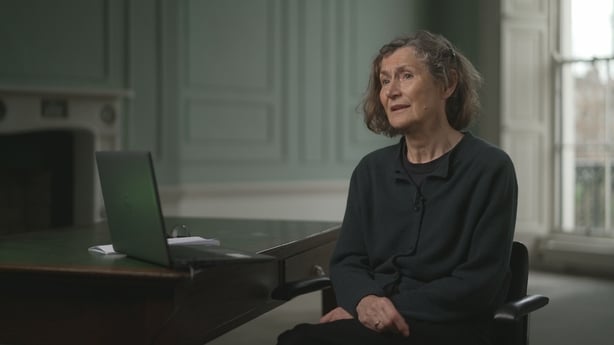
RTÉ Investigates wrote to Gianna Care but it did not respond.
However, another aspect of its services also caught our attention. On its website, under post abortion care, it includes referrals and funding for retreats with an American founded organisation called Rachel’s Vineyard.
Its Irish wing was set up in 2003 by Bernadette Goulding. A registered charity, Rachel’s Vineyard Ireland promotes itself as “therapy for the soul” and each year it holds weekend retreats for people to heal from what it says are the after-effects of abortion – sometimes with a qualified psychotherapist present.
Rachel’s Vineyard has held up to 30 retreats in Ireland in the last 10 years.
The retreats take place at private locations around the country including Co Cork where RTÉ Investigates recently had two undercover researchers attend for two out of three days.
There we encountered a series of strange therapies, including a requirement that participants carry a rock for the weekend as a symbol of what Rachel’s Vineyard said was the post abortion burden they carry.
The women were told to carry their rocks at all times, including to the dining room and shower.
“Literally even in bed, sleep with it because your pain never leaves you, so it’s glued to you now,” the Rachel’s Vineyard psychotherapist said.
“Those into this kind of retreats are going to be the most vulnerable and therefore the most susceptible and that’s the danger of this, it will just fuel those insecurities and vulnerabilities that you have,” Dr Jonathan Lord told RTÉ Investigates.
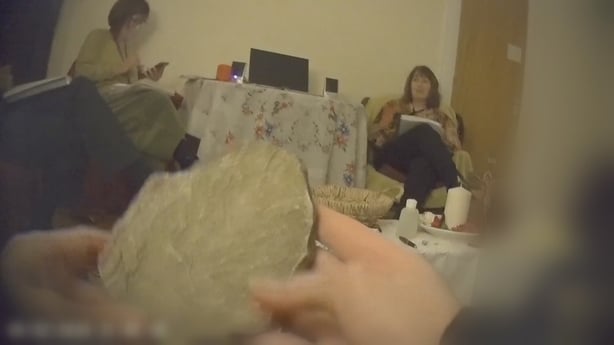
The retreat featured several other unusual rituals including encouraging those present to drink a bitter fluid to purge themselves of post abortion feelings such as depression, shame, guilt and suicidal urges, as well as asking participants to have wrapped in bandages the parts of their bodies “damaged” by abortion.
“I think religious freedom is fine but bringing vulnerable women there [to the retreat] under the guise that the abortion is the trauma, that they’re guilt ridden and that they need to divest themselves of their sins is obviously very damaging to their mental health. It’s very distressing to even look at it,” said Professor Veronica O’Keane.
At the retreat our researchers were also given literature linking growing rates of abortion and domestic violence, stating a woman who has had an abortion may be more likely to become involved with a violent man, “to experience what she unconsciously feels is the punishment I deserve”.
The women in attendance were also provided with a long list of symptoms of post abortion trauma including suicidal ideation, psychogenic or psychosomatic pain such as cramping and cervical pain, hallucinations of an infant crying, the creation of a phantom child or fixating on a doll or object weighing the same as an aborted child.
“Post abortion syndrome does not exist in the psychiatric community or in the psychiatric literature and it has been shown not to exist. It certainly isn’t something that belongs to mainstream psychiatry,” added Prof O’Keane.
Rachel’s Vineyard Ireland advises that post abortion women can free themselves by feeling their rage. At the retreat we also witnessed participants being encouraged to act out their anger on a cushion as they were told this was their “anointed, appointed time to let it go”.
“It just comes across to me not as a caring and empathetic event, but really as a cult,” Dr Jonathan Lord said.
In a statement, Rachel’s Vineyard Ireland said it assists women and men in reconciling painful emotions post abortion, and participants have given positive feedback to date. The charity added it does not accept the contention that post abortion trauma does not exist.
Rachel’s Vineyard plans to hold more retreats here this year.
The Advocate Women’s Centre and Gianna Care continue to operate their crisis pregnancy agencies.
Watch RTÉ Investigates: Ireland’s Abortion Services on Monday April 15 at 9:35pm on RTÉ One and RTÉ Player.
Documentary produced/directed by Lucy Kennedy.




